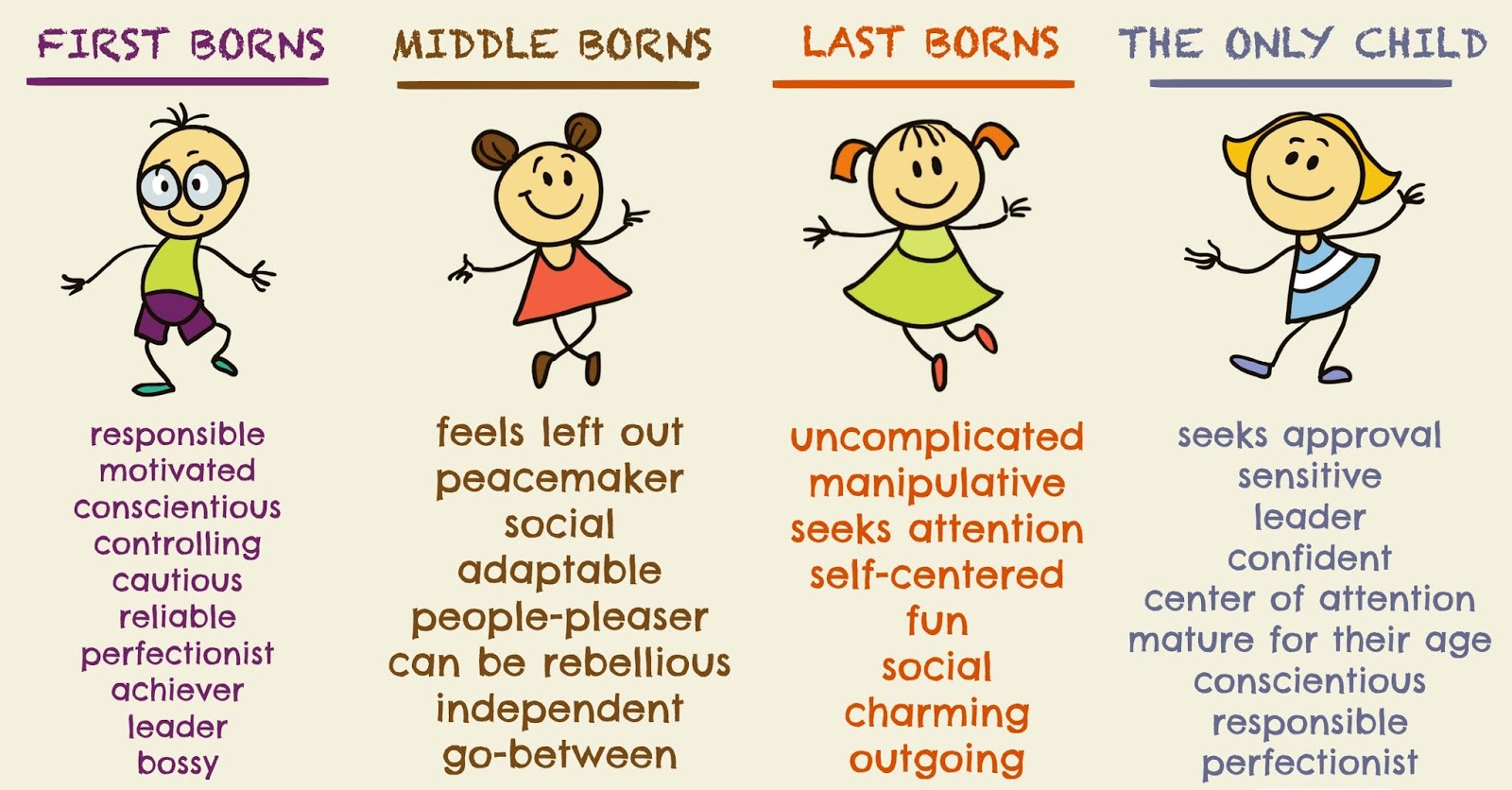Introduction
The notion that birth order determines personality is a long-standing and culturally popular belief. From the responsible and overachieving firstborns to the laid-back and rebellious youngest siblings, popular psychology has attributed a range of personality traits to one’s position in the family lineup. But do these beliefs hold any water when subjected to scientific scrutiny? Recent large-scale studies suggest the birth order effect may be more myth than reality.
Read More- Main Character Syndrome
The Origins of Birth Order Theory

The idea of birth order influencing personality was first proposed by Alfred Adler in the early 20th century. Adler, a contemporary of Freud, believed that siblings take on distinct roles within a family based on their birth order. He suggested that firstborns often feel “dethroned” upon the arrival of a sibling, leading to overachievement and conscientiousness. Middle children, caught between the older and younger, are thought to become peacemakers, while the youngest are often seen as pampered and attention-seeking (Adler, 1964).
Frank Sulloway (1996) later expanded on Adler’s theory with his Family Niche Theory. Sulloway argued that siblings compete for parental investment and carve out different niches within the family. According to his theory, firstborns align with authority and the status quo, while later-borns tend to be more rebellious, open to new experiences, and willing to challenge norms.
Empirical Challenges to the Theory
Despite its intuitive appeal, empirical research has largely failed to support strong or consistent links between birth order and personality.
- In a massive study involving over 377,000 U.S. high school students, Damian and Roberts (2015) found only tiny differences in personality traits associated with birth order. Firstborns scored slightly higher in conscientiousness and achievement motivation, but the effect sizes were so small as to be practically meaningless.
- Rohrer, Egloff, and Schmukle (2015) conducted another large-scale study with data from over 20,000 individuals across the U.S., UK, and Germany. Their results showed negligible differences in Big Five personality traits (openness, conscientiousness, extraversion, agreeableness, and neuroticism) by birth order, concluding that the effects were statistically detectable but practically insignificant.
- A meta-analysis by Richardson and colleagues (2021) reviewing over 100 studies came to a similar conclusion. After controlling for confounding variables such as family size, socioeconomic status, and parental attention, birth order effects on personality were minimal or nonexistent.
Exceptions and Nuances
While the overall evidence against strong birth order effects is compelling, there are nuances worth exploring. Some recent studies suggest that middle children may display slightly higher levels of agreeableness and honesty-humility, possibly due to their role in navigating sibling dynamics (Ashton & Lee, 2024).

Only children, often stereotyped as lonely or spoiled, actually perform well in academic and social domains. Falbo and Polit (1986) found that only children score similarly or even better on measures of intelligence and social adaptability compared to those with siblings.
Birth spacing also appears to play a role. Muslimova et al. (2020) found that the developmental advantages associated with being firstborn are amplified when genetic endowments are favorable and birth spacing allows for more parental investment.
Cultural and Contextual Factors
Cultural context significantly shapes the impact of birth order. In collectivist societies, for example, eldest children—particularly daughters—may take on caregiving roles, resulting in different developmental trajectories compared to their counterparts in individualistic cultures. Furthermore, socioeconomic factors often influence how much attention and resources parents can devote to each child, potentially mediating the effects attributed to birth order.
A Scandinavian registry study indicated that later-born children exhibited lower non-cognitive skills like persistence and emotional stability, but these were largely attributed to differences in parental investment and family dynamics rather than birth order itself (Black, Devereux, & Salvanes, 2011).
Persistence of the Birth Order Myth
Despite weak empirical support, the belief in birth order effects remains widespread. One reason is the power of anecdotal evidence and confirmation bias. People tend to remember instances that confirm their beliefs (e.g., their boss is a controlling firstborn) and ignore contradicting evidence. Pop psychology books and media also reinforce these stereotypes, making them more socially salient.

Moreover, the idea of birth order offers a simple heuristic to explain complex human behavior. In a world that often craves categorization, the appeal of such tidy psychological templates is understandable.
Conclusion
The scientific consensus is clear: birth order exerts, at most, a minimal effect on personality. While there may be subtle influences in specific contexts, such as cultural background or birth spacing, these are not robust enough to support the sweeping generalizations often made in popular discourse. Instead of attributing traits to birth order, it may be more fruitful to consider the broader family environment, parental investment, and individual life experiences.
References
Adler, A. (1964). Problems of neurosis. Harper & Row.
Ashton, M. C., & Lee, K. (2024). Middle children and personality: Cooperation and honesty in sibling dynamics. Journal of Family Psychology, 38(2), 120-134.
Black, S. E., Devereux, P. J., & Salvanes, K. G. (2011). Older and wiser? Birth order and IQ of young men. CESifo Economic Studies, 57(1), 103-120.
Damian, R. I., & Roberts, B. W. (2015). The associations of birth order with personality and intelligence in a representative sample of U.S. high school students. Journal of Research in Personality, 58, 96-105.
Falbo, T., & Polit, D. F. (1986). Quantitative review of the only child literature: Research evidence and theory development. Psychological Bulletin, 100(2), 176-189.
Muslimova, D., van Kippersluis, H., Rietveld, C. A., & Meddens, S. F. W. (2020). Birth order effects on educational attainment and cognitive skills: Genetic nurture or parental investment? arXiv preprint arXiv:2005.04634.
Richardson, L. M., Carter, K., & Lewis, R. (2021). Birth order and personality: A meta-analytic review. Personality and Individual Differences, 171, 110482.
Rohrer, J. M., Egloff, B., & Schmukle, S. C. (2015). Examining the effects of birth order on personality. Proceedings of the National Academy of Sciences, 112(46), 14224-14229.
Sulloway, F. J. (1996). Born to rebel: Birth order, family dynamics, and creative lives. Pantheon Books.
Subscribe to PsychUniverse
Get the latest updates and insights.
Join 3,045 other subscribers!
Niwlikar, B. A. (2025, July 28). The Myth of Birth Order and 3 Important Scientific Evidences Against It. PsychUniverse. https://psychuniverse.com/myth-of-birth-order/



